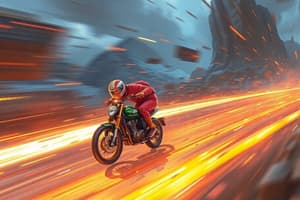Podcast
Questions and Answers
False (B)
Сила упругости, возникающая в теле, прямо пропорциональна величине его деформации (закон Гука).
Сила упругости, возникающая в теле, прямо пропорциональна величине его деформации (закон Гука).
True (A)
Кинетическая энергия груза увеличивается, когда он перемещается из положения 2 в положение 1.
Кинетическая энергия груза увеличивается, когда он перемещается из положения 2 в положение 1.
False (B)
Механическая энергия груза (сумма его кинетической и потенциальной энергии) не изменяется при колебаниях грузика.
Механическая энергия груза (сумма его кинетической и потенциальной энергии) не изменяется при колебаниях грузика.
Когда велосипедист начал торможение, его кинетическая энергия уменьшилась на 500 Дж, а потенциальная энергия увеличилась на 500 Дж.
Когда велосипедист начал торможение, его кинетическая энергия уменьшилась на 500 Дж, а потенциальная энергия увеличилась на 500 Дж.
Подтверждение закона Гука на графиках представлено только для тела 2.
Подтверждение закона Гука на графиках представлено только для тела 2.
На брусок действует сила трения, направленная вправо.
На брусок действует сила трения, направленная вправо.
При увеличении скорости шайбы на наклонной доске, сила совместного действия Земли и доски увеличивается.
При увеличении скорости шайбы на наклонной доске, сила совместного действия Земли и доски увеличивается.
Яблоко притягивает Землю с силой равной 3 Н.
Яблоко притягивает Землю с силой равной 3 Н.
Сила трения на брусок равна 1,9 ± 0,1 Н.
Сила трения на брусок равна 1,9 ± 0,1 Н.
За 3 секунды шайба на наклонной доске увеличила свою скорость на 2 м/с.
За 3 секунды шайба на наклонной доске увеличила свою скорость на 2 м/с.
Flashcards are hidden until you start studying
Study Notes
Measuring Atmospheric Air Mass
- Mass of atmospheric air was measured in different volumes, with an error of 0.3 m³ for volume and 0.5 kg for mass.
- A graph shows the results of these measurements.
Day and Night on Earth
- The change of day and night on Earth is explained by the Sun's rising and setting.
- This phenomenon is related to the Sun-centered system.
Pendulum Clock
- The graph shows the change in speed of a pendulum clock over time.
- The amplitude of the pendulum's speed is 0.2 m/s.
Boy on a Swing
- The graph shows the change in the boy's coordinate over time.
- The frequency of the boy's oscillations is 0.5 Hz.
Hooke's Law
- The experiment tested the assumption that the force of elasticity is directly proportional to the deformation of a body.
- The graph shows the change in Fynp with respect to A1 for two bodies.
- The assumption is confirmed for both bodies.
Hanging Weight
- A weight suspended from a thread oscillates from position 2 to position 1.
- If air resistance is neglected, the mechanical energy of the weight remains constant.
- The kinetic energy of the weight increases, while the potential energy remains constant.
Braking Bicyclist
- A bicyclist brakes and loses 500 J of kinetic energy in the first few seconds.
- The internal energy of the bicyclist and the surrounding environment decreases by 500 J.
Tension Force
- A dynamometer is pulled to the right with a attached block sliding on the table at a constant speed.
- The force of friction acting on the block is 1.88 ± 0.05 N, directed to the right.
Friction Force on a Block
- A block of mass 0.2 kg slides down an inclined plane and increases its speed by 1.2 m/s in 3 seconds.
- The resultant force of the Earth and the plane on the block is 0.144 N.
Gravitational Force
- An apple hanging from a branch is attracted to the Earth with a force of 3 N.
- The apple attracts the Earth with the same force of 3 N.
Studying That Suits You
Use AI to generate personalized quizzes and flashcards to suit your learning preferences.



